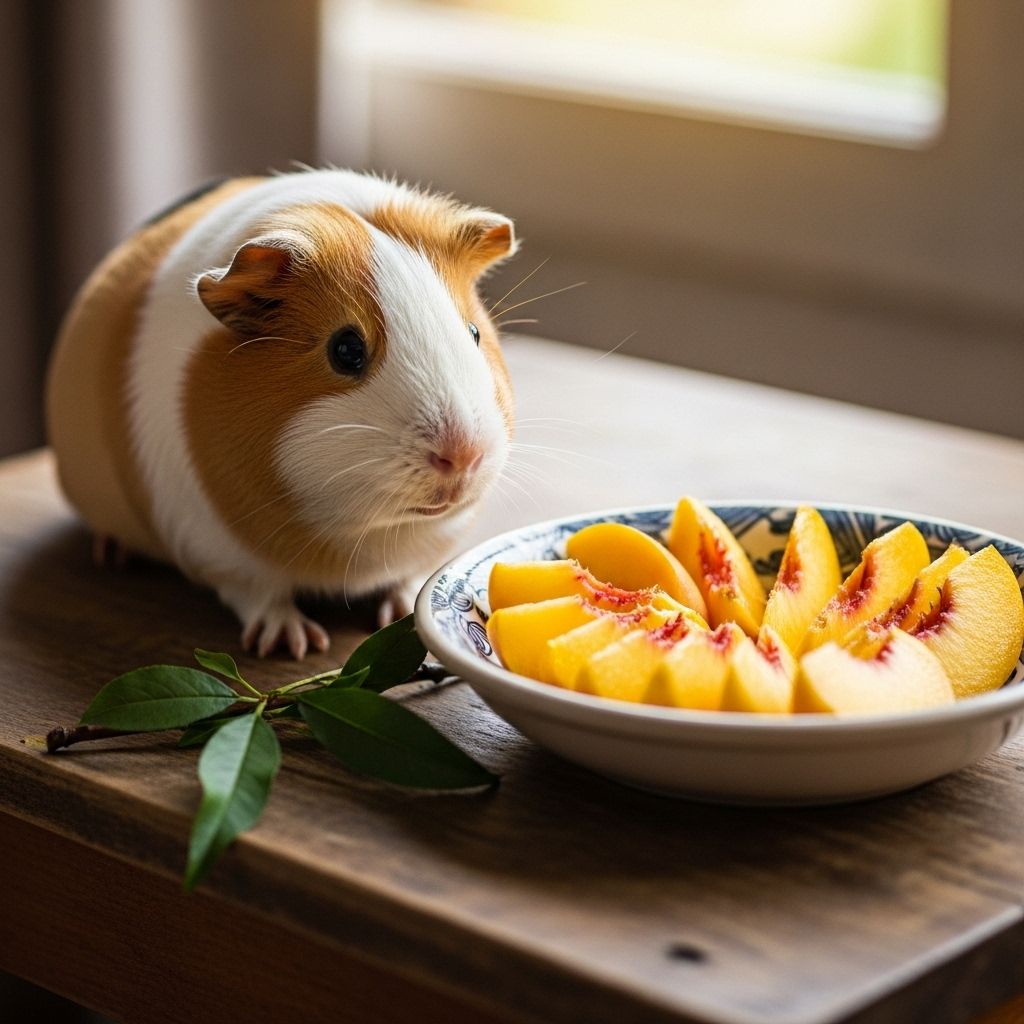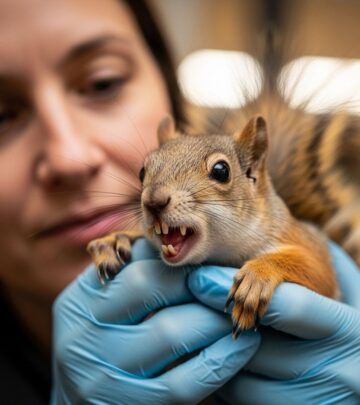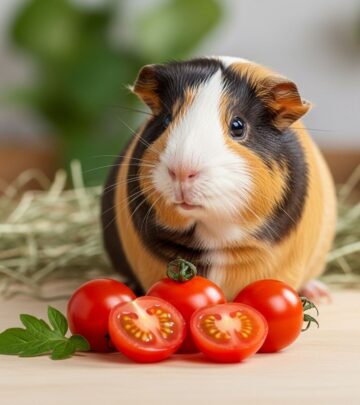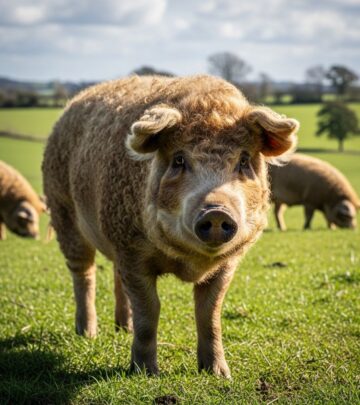Can Guinea Pigs Eat Peaches? Nutrition, Safety, and Serving Tips
Small fruit slices can enhance hydration and provide vitamin C in a balanced treat.

Guinea pigs are much-loved pets recognized for their sociable nature, distinctive squeaks, and the pleasure they bring to homes worldwide. Ensuring they receive a well-balanced, healthy diet is essential to their long-term well-being. Among the variety of foods guinea pig owners ask about, fruits like peaches often draw attention for their sweetness and juiciness. But are peaches safe to feed your guinea pig, and if so, how much?
Understanding the Guinea Pig Diet: Core Nutritional Needs
Guinea pigs are strict herbivores whose diet should be primarily made up of:
- Unlimited fresh hay (such as timothy or orchard grass) for fiber and dental health
- Fresh, high-quality guinea pig pellets containing vitamin C
- Daily servings of a variety of vegetables (especially leafy greens)
- Occasional fruit treats (provided in moderation due to sugar content)
- Fruits should generally not exceed 5% of the total diet
Vitamin C is a crucial part of a guinea pig’s diet because they cannot synthesize this essential nutrient on their own. Lack of vitamin C can lead to scurvy, a serious and sometimes fatal condition for guinea pigs.
Can Guinea Pigs Eat Peaches?
Yes, guinea pigs can eat peaches—but only in moderation. While peaches are not toxic and can provide some nutritional benefits, there are important factors to consider:
- Peaches are high in sugar, which can lead to digestive upset, obesity, and other health issues if fed in excess.
- The acidity of peaches can cause mouth or lip sores if large quantities are given.
- All pits and seeds must be removed, as they present both a choking hazard and a risk of cyanide toxicity.
Nutritional Overview: What Do Peaches Offer?
Peaches contain a variety of vitamins, minerals, and antioxidants. Here’s a look at some of the nutrients in peaches and their relevance to guinea pigs:
| Nutrient | Per 100g Peach | Benefits for Guinea Pigs |
|---|---|---|
| Vitamin C | ~6–7 mg | Immunity, skin, bone, and tissue health |
| Potassium | ~333 mg | Regulates nerve/muscle function |
| Vitamin A | ~570 IU | Supports vision, growth, immune system |
| Folate | 7 mcg | Cell repair/development |
| Other minerals (Ca, Mg, Fe, Cu) | Low–Moderate | Various biological functions |
| Sugar | ~8–9 g | Provides energy, but excess can cause problems |
| Acidity | Notable | Can cause sores if overfed |
Despite these nutrients, peaches are not significant contributors of vitamin C compared to other produce. Thus, they should remain an occasional treat, not a daily staple.
Health Benefits of Peaches for Guinea Pigs
- Vitamin C Content: Supports immune health and helps prevent scurvy.
- Potassium: Essential for muscle contractions and heart function.
- Hydration: Peaches are mostly water, helping keep your pet hydrated.
- Antioxidants: Compounds in peaches help neutralize free radicals, supporting overall health.
But Remember:
While these benefits exist, they are best realized through a varied and balanced diet, not from any single food item.
Potential Risks and Concerns
- High Sugar Content: Excessive sugar increases the risk of obesity, diabetes, and dental issues in guinea pigs.
- Acidity: Feeding too many peaches can contribute to mouth sores or digestive disturbances.
- Choking Hazard and Cyanide in Seeds: Never feed your guinea pig a peach pit or any seeds, as these pose choking and toxicity risks.
- Pesticide Exposure: Unwashed or non-organic peaches may contain harmful chemicals. Always wash fruit thoroughly and consider peeling it.
How to Safely Serve Peaches to Your Guinea Pig
- Choose fresh, ripe peaches.
- Wash thoroughly to remove any pesticides.
- Remove the pit and any seeds completely. Only the flesh is safe.
- Cut into very small, bite-sized cubes for easy eating and portion control.
- Peel the skin if you’re concerned about pesticide residues or your guinea pig has a sensitive digestive system, though organic skins may be safe for many pets.
- Offer a small portion, such as one or two pea-sized cubes, once or twice a week at most.
- Observe for any signs of digestive upset (diarrhea, loss of appetite); discontinue if any problems appear.
Table: Safe Fruit Serving Sizes for Guinea Pigs
| Fruit | Serving Size | Frequency |
|---|---|---|
| Peach | 1-2 pea-sized cubes | 1–2x weekly |
| Apple (no seeds) | 1 small slice | 1–2x weekly |
| Strawberry | 1 small berry | 1–2x weekly |
| Banana | Small slice | 1x weekly |
| Melon | 1–2 small cubes | 1–2x weekly |
Types of Peaches: Fresh, Canned, or Dried?
- Fresh peach flesh is the only recommended option for guinea pigs.
- Canned peaches should not be fed—these are usually packed in sugary syrups and may contain preservatives unsafe for guinea pigs.
- Dried peaches are very high in sugar and can present a choking hazard; do not serve these to guinea pigs.
Peach Parts: What’s Safe, What’s Not
- Pit: Never feed, as it is toxic and a choking risk.
- Seeds: Never feed for the same reasons as the pit.
- Leaves and stems: Avoid entirely, as these can be harmful.
- Flesh: Safe in small, seedless pieces.
- Skin: Optional, but wash well if you include it; may cause digestive upset in some pigs.
Alternatives to Peaches for Vitamin C and Sweet Treats
Since peaches are not the richest in vitamin C and are best offered occasionally, consider these fruits (in moderation):
- Guava – Very high in vitamin C
- Kiwi
- Strawberry
- Bell pepper (especially yellow/red) – for vitamin C boost with less sugar
- Orange – Small segments only due to acidity and sugar
Signs of Overfeeding Fruit or Dietary Distress
Monitor your guinea pig after introducing any new food, including peaches. Watch for:
- Diarrhea or loose stools
- Lethargy or change in behavior
- Mouth/lip sores
- Loss of appetite
- Unusual drooling
If you see these signs, stop offering the new treat and consult your veterinarian.
Frequently Asked Questions
Can guinea pigs eat peach pits or seeds?
No. The pits and seeds pose a serious choking hazard and contain trace amounts of cyanide, making them toxic. Always feed only the soft flesh.
Can guinea pigs eat canned or dried peaches?
No. Only fresh, plain peaches should be offered. Canned and dried fruits have too much sugar and often contain preservatives.
How often can guinea pigs have peaches?
No more than 1–2 small pieces (pea-sized cubes) once or twice per week is recommended.
Is peach skin safe for guinea pigs?
Peach skin is generally safe if washed thoroughly and if your guinea pig does not have sensitivities. For those with digestive issues, it’s better to remove the skin.
Are there any fruits guinea pigs must never eat?
Yes. Never feed avocado, rhubarb, or unripe/tough fruit parts. Also avoid fruit seeds and pits from all types of fruit.
What should be the main food in a guinea pig’s diet?
Unlimited fresh hay should form the basis of all guinea pig diets, with pellets and daily fresh vegetables supplementing their nutritional needs.
Summary: The Smart Way to Offer Peaches to Guinea Pigs
- Peaches are suitable as an occasional treat, not a daily part of the diet.
- Always serve small, seedless, fresh pieces.
- Avoid the pit, seeds, skins (if unwashed), and processed forms.
- Observe your pet after feeding new foods; consult a vet if problems arise.
Alongside responsible treats like peaches, be sure your guinea pig enjoys a diet rich in fiber, vitamin C, and fresh greens for optimal health and happiness.
Additional Resources
- Consult with an exotics veterinarian for specific dietary guidance.
- Review guinea pig nutrition guidelines from animal welfare organizations.
- Explore reputable pet care sites for updated lists of safe and unsafe foods.
References
- https://www.guineadad.com/blogs/news/guineadad-food-blog-can-guinea-pigs-eat-peaches
- https://articles.hepper.com/can-guinea-pigs-eat-peaches/
- https://www.tscpets.com/can-guinea-pigs-eat-peaches/
- https://oxbowanimalhealth.com/blog/foods-guinea-pigs-should-never-eat/
- https://www.pinterest.com/pin/pinterest–787848528576885897/
Read full bio of Anjali Sayee












